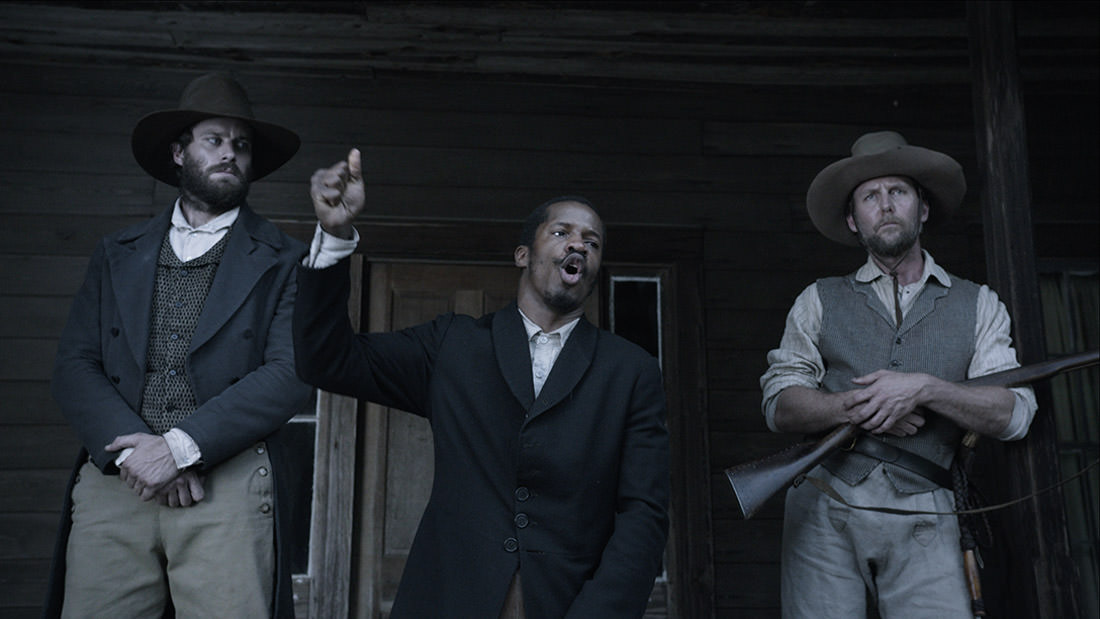Nate Parker’s gripping “The Birth of a Nation” opens with a
young Nat Turner deep in the woods of Virginia in the early 1800s. He is taken
to a ceremony in which an elder proclaims him to be a future prophet. The man
repeats a phrase—“We should listen to him. We should listen to him. We should
listen to him.” Parker’s film is both an attempt to force modern audiences to
listen to the story of Nat Turner and the announcement of a new directorial talent. Directing, working from his own script, and starring in
the film as well, Parker’s passion comes through in every element of “The Birth
of a Nation.” The result is a film that feels less like an educational
drama and more like a reclamation of history. It is a powerhouse of a film that
sometimes displays the debut status of its director but its mistakes are
entirely forgivable due to the sheer force of the filmmaking.
When he was a young boy, Turner was allowed to learn how to
read by his slave owner, unlike most slaves. His female slave owner (Penelope
Ann Miller) only allowed him to read one book—the Holy Bible—and it turned
Turner into a Man of God. As he grew up on the plantation, his understanding of
the Bible made him a natural leader, allowing him to preach to his fellow
slaves in the fields. He married a fellow slave (Aja Naomi King), and his master (Armie Hammer) realized that there was a need
for preachers on other plantations, largely in the hope that the slaves would
listen to a fellow slave telling them to behave or risk God’s wrath. Turner’s master
would be paid for the visits, but the result was that Turner was allowed to see
the full scope of slavery across Virginia. On his tour, he sees a little girl
being paraded across a porch on a leash that’s more of a noose around her neck;
he sees a man get his teeth knocked out with a chisel so he’ll be forced to
eat; he sees unimaginable horror, and Parker holds nothing back, refusing to
present slavery as just a background or setting as Hollywood so often he has. The
brutality of “The Birth of a Nation” can be enough to make viewers turn away,
such as when Turner’s wife is beaten to the point that she’s unrecognizable or
Turner is whipped to the point of collapse. Parker clearly understands that the horror that led to rebellion cannot be muted to be effective.
In 1831, Turner led that rebellion. Anyone with even the
slightest sense of American history knows that’s where Parker’s film will
inevitably climax, and yet the build to it and the event itself are handled in a dramatically effective and downright
terrifying way. Most of all, Parker is absolutely phenomenal, portraying Turner as a man
whose rage and need for revolution simmered inside him, spurred on not only by
what he saw but a Bible that also conveyed the injustice of the world around
him. Parker’s take on Turner is more internal than a lot of actors would have
gone or a lot of directors would have crafted—he is a man who watches, and the
way he uses scripture to convey his increasing rage in the midsection of the
film is captivating. There’s nothing flashy or showy about Parker’s performance—it
is both extremely physical but rounded out by the internal turmoil that he conveys through his eyes. His faith and his intelligence spurred him on as much as his physical courage, and those elements can be difficult to convey in a performance but Parker never loses sight of the complexity of this man. His reclamation is a humanizing one as much as anything else. We need to know the human to understand why his legacy still matters.
Having worked on “The Birth of a Nation” for seven years,
Nate Parker wisely found the right people to help convey his passion project.
Notably, the cinematography from the great Elliot Davis (“King of the Hill,” “Out
of Sight”) finds a balance between the lyrical and the realistic, never falling
too hard on either side of the line. There are poetic elements of “Birth of a
Nation”—an ear of corn that starts bleeding, an eclipse before the revolution—that
help convey the idea that Turner’s journey was one of destiny but Parker and
Davis don’t rely too heavily on the poetic. Davis’ camera has a fluidity that
often allows us to feel like an observer of reality, watching a legacy form.
And Henry Jackman’s score (“Captain Phillips”) is a beauty, again conveying
importance without falling into that easy trap of melodrama.
Make no mistake though—this is Nate Parker’s film through
and through. It’s his writing, direction and performance that give the piece
its undeniable energy. There are a few moments when one can sense that this is
a first-time director—largely in his work with the rest of the cast (some of
whom can be distractingly broad or simply ineffective and I think the piece
would have been stronger overall with a few ensemble performances that matched
Parker’s) and a few beats that feel off in terms of timing. However, I’m
willing to forgive the few rough edges because they are byproducts of a
man with a story to tell, and the ability to relay his passion and deep
understanding of history and humanity to as wide an audience as possible. We
should listen to him.












